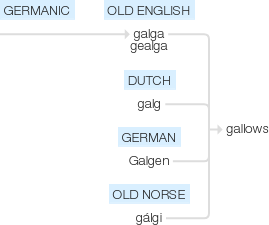Gallows
Old English galga, gealga, of Germanic origin; related to Dutch galg and German Galgen ; reinforced in Middle English by Old Norse gálgi .
wiktionary
From Middle English galwes, galewes, galowe, galwe, from Old English ġealga, from Proto-Germanic *galgô, from Proto-Indo-European *ǵʰalgʰ-, *ǵʰalg-(“long switch, rod, shaft, pole, perch”). Compare West Frisian galge, Dutch galg, German Galgen, Danish galge, Icelandic gálgi.
gallows
etymonline
gallows (n.)
c. 1300, plural of Middle English galwe "gallows" (mid-13c.), from Old Norse galgi "gallows," or from Old English galga (Mercian), gealga (West Saxon) "gallows;" all from Proto-Germanic *galgon "pole" (source also of Old Frisian galga, Old Saxon galgo, Middle High German galge "gallows, cross," German Galgen "gallows," Gothic galga "cross"), from PIE *ghalgh- "branch, rod" (source also of Lithuanian žalga "pole, perch," Armenian dzalk "pole").
In Old English, also used of the cross of the crucifixion. Plural because made of two poles. Gallows-tree is Old English galg-treow. Gallows humor (1876) translates German Galgenhumor.
